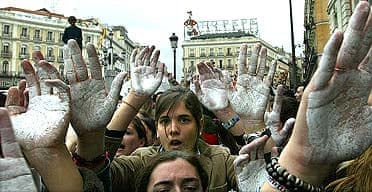Millions of Spaniards streamed into cold and rainy streets tonight in silent tribute to the 199 people killed in the country's worst terrorist attack, while the armed Basque separatist group, Eta, denied government suggestions they were behind the carnage.
The Spanish prime minister, Jose Maria Aznar, pledged to hunt down those responsible for yesterday's coordinated attacks - 10 bombs that blew up four trains in Madrid in a 15-minute span - but said the investigation has not yet pinpointed who was responsible.
The country's interior minister, Angel Acebes, said Eta remained the prime suspect, but the group denied responsibility for the attacks today, a Basque newspaper said.
The pro-Basque independence daily Gara, which Eta often uses to issue statements, told AP that a caller claiming to represent the group telephoned its newsroom to deny government allegations that the group was behind the attacks. The leader of Batasuna, Eta's political wing, also denied that the group had been involved, and accused the government in Madrid of lying to seek political advantage in Sunday's national elections.
"The Spanish government is lying deliberately," Arnaldo Otegi told reporters in the northern city of Bilbao.
If Eta is found responsible for Thursday's attacks, that could boost support for Mariano Rajoy, Mr Aznar's hand-picked candidate to become Spain's next leader. Both have supported a popular hardline crackdown on the group, which is fighting for an independent state, and ruled out talks.
However, if Thursday's bombing is seen by voters as the work of al-Qaida, that could draw voters' attention to Mr Aznar's vastly unpopular decision to endorse the US-led invasion of Iraq and the deployment of Spanish troops.
Mr Aznar said today that all leads would be followed in the investigation.
"No line of investigation will be ruled out," he told a news conference. "Nothing would please me more than to say 'these are the murderers' and to bring them to justice."
Spain's foreign minister, Ana Palacio, said evidence "pointed towards" Eta, but the investigation could not exclude any other possibility. A shadowy al-Qaida-linked group yesterday claimed responsibility for the attack in an email to London-based Arabic newspaper al-Quds al-Arabi.
The Brigade of Abu Hafs al-Masri said it had succeeded in "infiltrating the heart of crusader Europe" and targeting a key US ally.
Suspicion that a radical Islamist group was behind the attack increased when detonators and a tape of Arabic verses were found in a stolen van parked at a railway station where two of the three trains originated and one passed through.
But the Abu Hafs Brigade has made spurious claims of responsibility in the past - including for the New York power cut last year - and there is evidence to link Eta to the bombs.
The type of explosive - Titadine - was of a kind used previously by the group, and police claim to have thwarted a similar attack on another big Madrid railway station at the end of last year.
Two suspected Eta members were also arrested a fortnight ago attempting to bring 500kgs of explosive to Madrid.
Suspicion that al-Qaida may have been behind the atrocity, however, has sent shockwaves around the world.
Poland and Italy, who both supported the US in Iraq, have stepped up security.
Mr Aznar led the solidarity march in Madrid tonight. He was joined by other European leaders, including Silvio Beruscloni of Italy, Jean-Pierre Raffarin of France and the European commission president Romano Prodi, with the Europe minister, Dennis MacShane, and deputy prime minister, John Prescott, representing Britain.
All the television stations placed a small red and yellow Spanish flag with a black sash in the corner of the screen and commuter trains travelled with sashes on the engine cars.
The 10 rucksack bombs exploded in a 15-minute span, starting at about 7.39am local time (6.39am GMT), on trains along nine miles of commuter line from the Santa Eugenia station to Atocha.
Victims from the Madrid bombs included 14 nationals of 10 other countries: three Peruvians, two Hondurans, two Poles, one Chilean, one Cuban, one Ecuadorean, one from Guinea Bissau, one French, one Moroccan and one Colombian.
